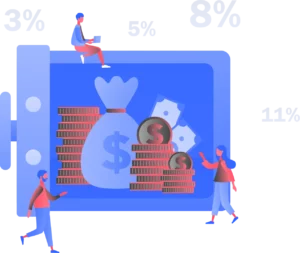Many Canadians find themselves burdened with debt. These debts may include credit card bills, student loans, car payments, or other financial liabilities. Dealing with these debts individually can become overwhelming and stressful.
You are not alone if you are struggling with bills due to high interest (Marfo, D., 2023). A debt consolidation loan could help you.
Advertisements
What is a debt consolidation loan?
Debt consolidation combines multiple debts into a single loan, resulting in one regular payment. Debt consolidation loans often come with a lower overall interest rate than the average rate of the individual debts.
This approach can benefit those with substantial debt with high interest. Debts that can be combined include credit cards, personal loans, student loans, mortgages, and tax debt.
How does a debt consolidation loan work?

Debt consolidation loans have lower interest rates, making paying off debt with one monthly or bi-weekly payment easier. These loans help to simplify your finances and reduce the stress of multiple payments. Your credit score will likely improve if you keep up your consolidation loan payments and do not take on new debt.
The process for consolidating debt typically involves the following steps.
Evaluate your debt
Begin by thoroughly assessing your current debts (Government of Canada, 2023). List all your debt types, their balances, interest rates, and average monthly payments. Calculate the outstanding balances since this is the amount you need to consolidate into one loan.
Another helpful step when evaluating your debt is averaging your interest rates. Calculate the average of your interest rates by adding them together and dividing the sum by the number of rates. This average rate will be a good benchmark when evaluating your consolidation loan offers.
Run the same calculation for your monthly payments to see if the new loan's monthly payments are lower.
Research lenders
Research and compare lenders that offer debt consolidation loans. Most pre-approval processes do not result in a hard hit on your credit record. Check what you qualify for, interest rates, fees, repayment terms, and customer reviews for each lender.
Look for reputable creditors with transparent terms and favourable rates. Compare the averages you calculated earlier with what the moneylenders are offering.
Any major bank or credit union will typically have debt consolidation options. They may recommend a line of credit, home equity line, or credit mix to help you avoid third-party high-interest loans.
A finance company may also be another option to consolidate debts. Finance companies can potentially provide a lower interest rate unsecured loan with a single monthly payment. However, with a lower monthly payment on the new debt, the repayment schedule might result in more interest paid in the long run.
Advertisements
Apply for a loan
Once you have chosen a lender, complete the application form. Most lenders have an all-online application process. You must provide personal details like your name, address, job and income information, and Social Insurance Number (SIN).
The backer will review your application and assess your creditworthiness, payment history, and existing debt to determine if you qualify for a loan.
Approval and receipt of funds
If approved, the lender will provide you with a loan agreement detailing terms such as the following:
Principal amount (how much the lender is willing to give you)
Interest rate
Repayment term
Monthly payment amount
Terms and conditions regarding early repayment, late payment, non-payment, and other related factors
Review the agreement carefully. Ensure you understand the terms before signing and accepting the loan.
Once you accept the agreement, the lender will disburse (transfer) the funds to you. INTERACT e-Transfer or issuance of a cheque are generally the preferred disbursement methods.
Pay off your debts
With the loan funds in hand, pay off your old debt. Contact each creditor to obtain the necessary payoff information and allocate the funds correctly.
Be diligent in paying off all your debts, leaving you only the new loan to manage. Ensure you do not accrue new debt.
Repay the consolidation loan
Make your monthly payments on time and in full according to the consolidation loan terms. Direct debit helps you ensure your payments are made on time. You are now on your way to reducing your debt and becoming debt-free.
Stick to your budget and avoid accumulating new debt while repaying the debt consolidation loan. Your new monthly payment is meant to ease your financial circumstances, not negatively affect them.
Advantages of debt consolidation

Debt consolidation offers several advantages that can enhance your financial well-being. Here are some of the key benefits:
Simplified payments: With your debts now one loan, you can restructure your finances and work toward becoming debt-free. Instead of managing multiple debts, due dates, and interest rates, you have only one monthly payment to keep track of. Be sure always to make your minimum payment.
Lower interest rates: Though not guaranteed, consolidation loans can lower your interest rate. This is especially true if you have high-interest debt. Examples of high-interest debt include credit card balances, lines of credit, and payday loans. It is a good idea to consolidate credit card debt. Consolidation loans are a much better option than balance transfer credit cards.
Credit score improvement: Depending on the types of debt you carry, a consolidation loan will be better for your credit report in the long run. With the way debt consolidation works, successfully managing the loan will positively impact your credit score. You can gradually improve your creditworthiness by reducing debt and demonstrating responsible financial behaviours.
Reduced stress: Juggling multiple debts and payments can be incredibly stressful. Debt consolidation streamlines your finances. This efficiency reduces the mental and emotional burden associated with overwhelming debt. With greater control over your finances, your overall financial life will improve.
Advertisements
Disadvantages of a consolidation loan
We have reviewed the advantages of debt consolidation. However, it is essential to consider the potential disadvantages as well. Here are some factors to keep in mind:
Potentially higher interest: Consolidating debt may lower interest rates, but extending the repayment term could lead to paying more interest in the long run. To make a sound financial choice, compare the total cost of the new loan with your current debts.
Risk of accumulating new debt: Consolidating debt does not address the underlying behaviours that led to debt accumulation. If you continue to spend beyond your means, you may be in a worse financial situation. For example, if you take out a new home equity loan or accumulate credit card debt after consolidating your debt, you might be heading for trouble.
Qualification requirements: Not everyone will qualify for a consolidation loan. Lenders typically require a good credit score, stable employment, and consistent income to approve your application. If you have a low credit score or high debt-to-income ratio (DTI), qualifying for a loan with favourable terms may be difficult.
Possible fees and penalties: Some consolidation loans come with origination fees or prepayment penalties. Read the terms and conditions of the loan agreement carefully. You must understand all costs associated with your new loan.
Do consolidation loans hurt your credit?
A debt consolidation loan can be suitable for your credit if you manage the loan carefully and avoid accumulating new debt. Missing payments on your loan, overspending, or increasing debt-to-income ratio will harm your credit.
Addressing the underlying behaviours that led you to take out a consolidation loan is vital. Without this financial course correction, you could be heading for trouble.
Advertisements
Why would you consolidate loans?
There are many reasons to consolidate debt. High interest, the burden of managing multiple payments, or overwhelming debt are common reasons. Consolidating numerous loans can lower your interest payments and reduce the stress of managing multiple debts.
You can improve your credit score and overall financial well-being if you diligently manage your consolidation loan.
Conclusion
Debt consolidation can be an effective debt management strategy that improves your creditworthiness and overall health. Combining debts, like credit card debt, into one loan with lower interest can help you reorganize your finances and save money on interest payments.
It is crucial to consider the advantages and disadvantages of consolidation loans. You should also determine if it aligns with your financial goals and situation. You do not want to put yourself in a position where you once again manage debt, missed payments, or multiple credit cards.
Remember, you can always seek professional advice if unsure about the best course of action for your specific needs. A debt management program, debt settlement, or debt repayment program may be other great alternatives.
Advertisements




